(完整版)PEP小学英语五年级下册各单元知识重点归纳
人教PEP版小学五年级下册英语单元复习课件(全册)

does和doesn’t 在句中的用法
2.一般疑问句:Do(Does)+主语+动词原形+其它。 eg:Do you often play sports? 你经常做运动吗? Yes, I do. / No, I don’t. 当主语为第三人称单数时,要用does构成。 eg:Does she/he often play sports? Yes, she/he does. / No, she/he doesn’t.
语法:动词词组的固定搭配
3.have + 课程/三餐 eg:have English(上英语课), have maths(上数学课)
have breakfast(吃早餐),have lunch(吃午餐) 4.do 做什么事情
do homework(做家庭作业), do kung fu(练功夫), do morning exercises(做早操)
四、Read and translate. 英汉互译。 1. 他的英语书 _h__is_E__n_g_li_s_h_b_o_o_k 2. 我自己 __m__y_s_e_lf____ 3. my teacher __我__的__老__师__ 4. those ____那__些____
2. you (复数形式) __y_o_u_ 4. these (反义词)_t_h_o_s_e
动词变成相应的三单形式
在一般现在时中,跟在第三人称单数后面的动词也要变成相应的三单 形式。 eg: I go shopping every day. 如果主语是三单,动词要变化: He goes shopping every day. She goes shopping every day. Jane goes shopping every day.
PEP小学英语五年级下册各单元知识重点总结
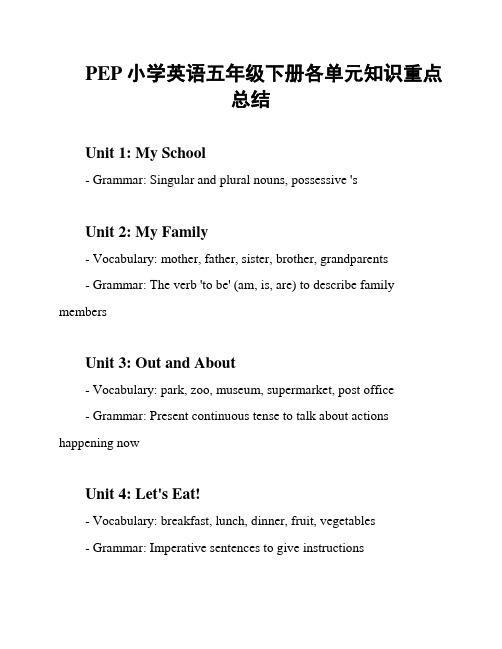
PEP小学英语五年级下册各单元知识重点总结Unit 1: My School- Grammar: Singular and plural nouns, possessive 'sUnit 2: My Family- Vocabulary: mother, father, sister, brother, grandparents- Grammar: The verb 'to be' (am, is, are) to describe family membersUnit 3: Out and About- Vocabulary: park, zoo, museum, supermarket, post office- Grammar: Present continuous tense to talk about actions happening nowUnit 4: Let's Eat!- Vocabulary: breakfast, lunch, dinner, fruit, vegetables- Grammar: Imperative sentences to give instructionsUnit 5: At the Farm- Vocabulary: farmer, barn, cow, pig, chicken- Grammar: There is/There are to talk about existenceUnit 6: Our Town- Vocabulary: street, hospital, police station, fire station, city- Grammar: Prepositions of place (in, on, under, behind, next to)Unit 7: Weather Report- Vocabulary: sunny, cloudy, rainy, snowy, windy- Grammar: Adjectives to describe weatherUnit 8: Fun with Friends- Vocabulary: play, sing, dance, swim, draw- Grammar: Simple present tense to talk about daily activitiesUnit 9: In the Ocean- Vocabulary: fish, dolphin, shark, octopus, seahorse- Grammar: Wh- questions using 'What' and 'Where'Unit 10: Happy Holidays- Vocabulary: Christmas, Easter, Halloween, New Year's Day, Thanksgiving- Grammar: Use of can for ability。
(完整版)人教版小学PEP英语五年级下册知识点归纳
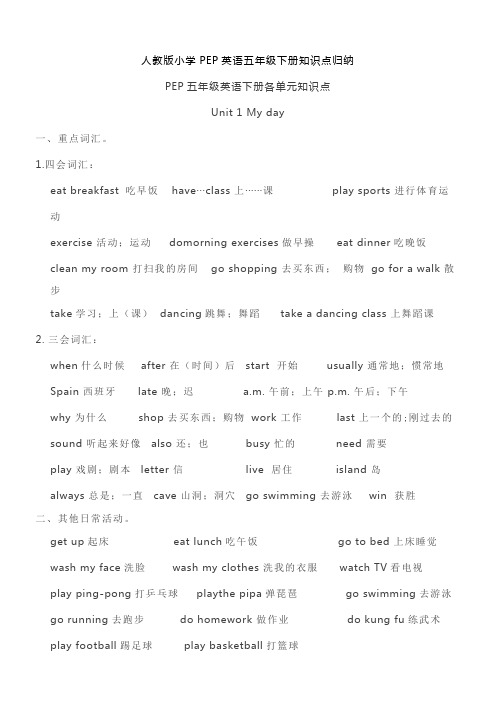
人教版小学PEP英语五年级下册知识点归纳PEP五年级英语下册各单元知识点Unit 1 My day一、重点词汇。
1.四会词汇:eat breakfast 吃早饭 have···class 上······课play sports 进行体育运动exercise 活动;运动 domorning exercises做早操eat dinner吃晚饭clean my room 打扫我的房间go shopping 去买东西;购物go for a walk 散步take学习;上(课) dancing跳舞;舞蹈 take a dancing class 上舞蹈课2. 三会词汇:when什么时候after 在(时间)后start 开始usually 通常地;惯常地Spain 西班牙late 晚;迟 a.m. 午前;上午 p.m. 午后;下午why 为什么shop 去买东西;购物work 工作last 上一个的;刚过去的sound 听起来好像also 还;也busy 忙的 need 需要play 戏剧;剧本letter 信live 居住island 岛always 总是;一直cave 山洞;洞穴go swimming 去游泳 win 获胜二、其他日常活动。
get up起床 eat lunch吃午饭 go to bed 上床睡觉wash my face洗脸 wash my clothes 洗我的衣服 watch TV看电视play ping-pong打乒乓球 playthe pipa弹琵琶 go swimming去游泳go running去跑步 do homework 做作业 do kung fu练武术play football踢足球 play basketball打篮球三、频度副词。
always总是,一直(100%) usually通常(80%)often 经常(60%) sometimes(30%)有时四、疑问词。
最新PEP小学英语五年级下册第三单元重点知识
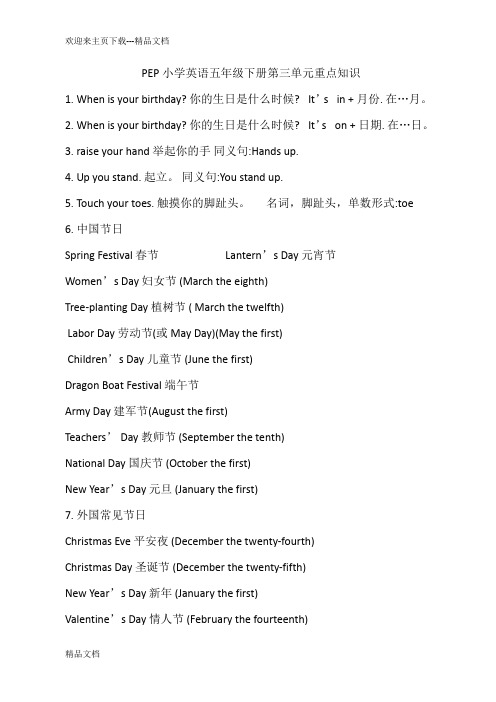
PEP小学英语五年级下册第三单元重点知识1. When is your birthday? 你的生日是什么时候? It’s in + 月份. 在…月。
2. When is your birthday? 你的生日是什么时候? It’s on + 日期. 在…日。
3. raise your hand 举起你的手同义句:Hands up.4. Up you stand. 起立。
同义句:You stand up.5. Touch your toes. 触摸你的脚趾头。
名词,脚趾头,单数形式:toe6. 中国节日Spring Festival 春节Lantern’s Day 元宵节Women’s Day 妇女节 (March the eighth)Tree-planting Day 植树节 ( March the twelfth)Labor Day 劳动节(或May Day)(May the first)Children’s Day 儿童节 (June the first)Dragon Boat Festival 端午节Army Day 建军节(August the first)Teachers’ Day 教师节 (September the tenth)National Day 国庆节 (October the first)New Year’s Day 元旦 (January the first)7. 外国常见节日Christmas Eve 平安夜 (December the twenty-fourth)Christmas Day 圣诞节 (December the twenty-fifth)New Year’s Day 新年 (January the first)Valentine’s Day 情人节 (February the fourteenth)April Fool’s Day 愚人节 (April the first)Mother’s Day 母亲节 (Mother’s Day is the second Sunday in May.) Father’s Day 父亲节 (Father’s Day is the third Sunday in June.)Independence Day 美国独立日 (July the fourth)Halloween 万圣节前夕 (October the thirty-first)Thanksgiving Day 感恩节( In America it is the third Thursday in November)8. How many birthdays are there in January? 一月份有多少生日? There be 句型提问,也要用There is/are … birthdays in …来回答9. Is your birthday in February, too? 你的生日也在二月吗? 一般疑问句,改为陈述句:Your birthday is in February, too.10. -What are you doing? 你正在干什么?- I am making a birthday chart for our family. 我在为我们的家庭做一张生日图。
人教PEP版小学五年级下册英语第三单元知识点
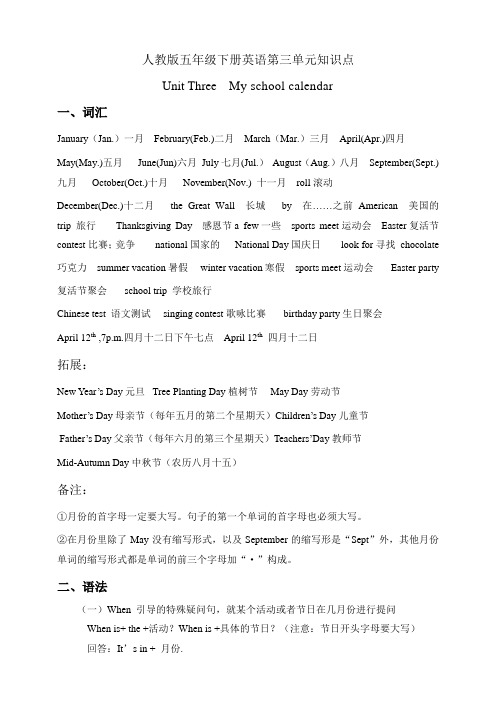
人教版五年级下册英语第三单元知识点Unit Three My school calendar一、词汇January(Jan.)一月February(Feb.)二月March(Mar.)三月April(Apr.)四月May(May.)五月June(Jun)六月July七月(Jul.)August(Aug.)八月September(Sept.)九月October(Oct.)十月November(Nov.) 十一月roll滚动December(Dec.)十二月the Great Wall 长城by 在……之前American 美国的trip 旅行Thanksgiving Day 感恩节a few一些sports meet运动会Easter复活节contest比赛;竞争national国家的National Day国庆日look for寻找chocolate 巧克力summer vacation暑假winter vacation寒假sports meet运动会 Easter party 复活节聚会 school trip 学校旅行Chinese test 语文测试 singing contest歌咏比赛 birthday party生日聚会April 12th ,7p.m.四月十二日下午七点April 12th四月十二日拓展:New Year’s Day元旦 Tree Planting Day 植树节 May Day 劳动节Mother’s Day母亲节(每年五月的第二个星期天)Children’s Day 儿童节Father’s Day父亲节(每年六月的第三个星期天)Teachers’Day教师节Mid-Autumn Day 中秋节(农历八月十五)备注:①月份的首字母一定要大写。
句子的第一个单词的首字母也必须大写。
②在月份里除了May没有缩写形式,以及September的缩写形是“Sept”外,其他月份单词的缩写形式都是单词的前三个字母加“·”构成。
新人教版PEP 【小学五年级英语下册】 单元知识点 归纳总结

新人教版PEP 【小学五年级英语下册】单元知识点归纳总结Unit 1 My DayIn this unit。
we learn some core vocabulary words。
phrases。
and XXX.Core Vocabulary:1.Verbs: take (studying)。
go to (class)2.Nouns: dancing。
exercise。
sports3.Phrases: do morning exercises。
eat breakfast。
play sports。
eat dinner。
go for a walk。
go shopping。
clean my room。
take a dancing class。
have a classXXX Vocabulary:1.Verbs: start。
shop。
work。
need。
live。
win。
sound2.Nouns: Spain。
play。
letter。
island。
cave3.ns: after4.XXX: when。
XXX。
a.m。
p.m。
why。
last。
also。
busy5.nal Vocabulary: frequency adverbs (always。
usually。
sometimes)Phrases:watch TV。
eat lunch。
go to bed。
go swimming。
go home。
go to schoolCore Sentence Structure:When do you do morning exercises?" "At 7 o'clock."XXX phrase is "good job" to praise XXX.Which season do you like best。
I like winter best。
This sentence means "which one do you like the most" and "like。
PEP小学英语五年级下册各单元重点内容概述
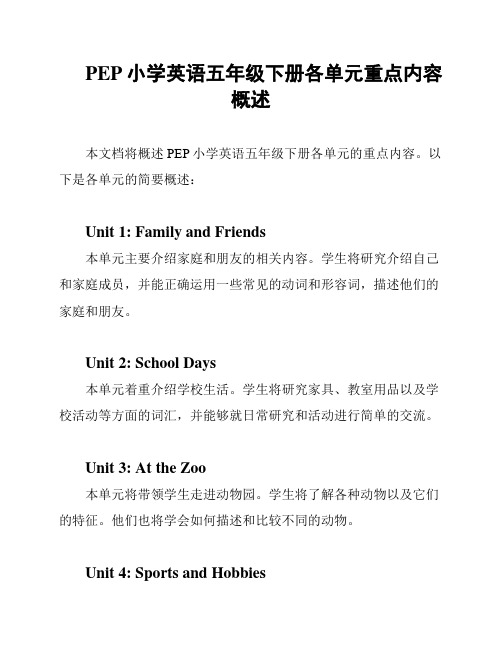
PEP小学英语五年级下册各单元重点内容概述本文档将概述PEP小学英语五年级下册各单元的重点内容。
以下是各单元的简要概述:Unit 1: Family and Friends本单元主要介绍家庭和朋友的相关内容。
学生将研究介绍自己和家庭成员,并能正确运用一些常见的动词和形容词,描述他们的家庭和朋友。
Unit 2: School Days本单元着重介绍学校生活。
学生将研究家具、教室用品以及学校活动等方面的词汇,并能够就日常研究和活动进行简单的交流。
Unit 3: At the Zoo本单元将带领学生走进动物园。
学生将了解各种动物以及它们的特征。
他们也将学会如何描述和比较不同的动物。
Unit 4: Sports and Hobbies本单元将探讨体育和爱好。
学生将研究描述不同体育运动和爱好的词汇,并能够就自己的喜好进行表达。
Unit 5: Food and Health本单元将关注食物和健康。
学生将研究各种食物的名称和描述,同时也会探讨健康和饮食惯的重要性。
Unit 6: My Neighborhood本单元将介绍学生所在的社区。
学生将研究描述自己的住所和周围环境的词汇,并能够就不同位置进行简单的指示。
Unit 7: Weather and Seasons本单元将涉及天气和季节。
学生将研究各种天气状况的词汇和描述,并了解不同季节的特点。
Unit 8: Holidays and Festivals本单元将介绍各种假期和节日。
学生将研究诸如春节、圣诞节等节日的名称和庆祝活动,并能够就个人喜好进行交流。
Unit 9: On the Farm本单元将带领学生了解农场。
学生将研究农场里各种动物和农作物的名称,并能够描述它们的特点。
Unit 10: Travel and Adventure本单元将聚焦旅行和冒险。
学生将研究描述不同交通工具以及旅行地点的词汇,并能够描述自己的旅行经历。
以上是PEP小学英语五年级下册各单元的重点内容概述。
【口袋书】人教版PEP五年级下册英语 基础知识汇总

人教版PEP五年级下册基础知识汇总Unit 1 My day.重点单词:[四会]dancing 跳舞;舞蹈exercise 活动;运动take 学习;上(课)[三会]after 在(时间)后start 开始usually 通常地;惯常地Spain 西班牙late 晚;迟a.m.午前;上午p.m.午后;下午why 为什么shop 去买东西;购物work 工作last 上一个的;刚过去的sound 听起来好像also 还;也busy 忙的need 需要play 戏剧;剧本letter 信live 居住island 岛always 总是;一直cave 山洞;洞穴win 获胜重点短语:eat breakfast 吃早饭have … class 上…课play sports 进行体育运动do morning exercises 做早操eat dinner 吃晚饭clean my room 打扫我的房间go for a walk 散步go shopping 去买东西;购物take a dancing class 上舞蹈课go swimming 去游泳start class 开始上课last night 昨天晚上after lunch 午饭以后a lot of fun 许多乐趣live on an island 住在一座岛上be good at sports 擅长体育运动字母组合cl 发/kl/ 音:clean 打扫clock 钟class 课;班级clever 聪明的clock 钟字母组合pl 发/pl/ 音:plate 盘子;碟子eggplant 茄子please 请play 玩耍;戏剧重点句型:1.询问别人什么时候做某事的问句及回答:-- When do/does + 主语+ 动词(短语)原形(+ 其他)?-- 主语(+ 频度副词)+ 动词(短语)原形/ 第三人稀单数形式+ at + 具体时间/ At + 具体时间.-- When do you get up? 你什么时候起床?-- I get up at 5 o'clock. 我5点起床。
人教版PEP小学英语五年级下册知识点汇总(最新)
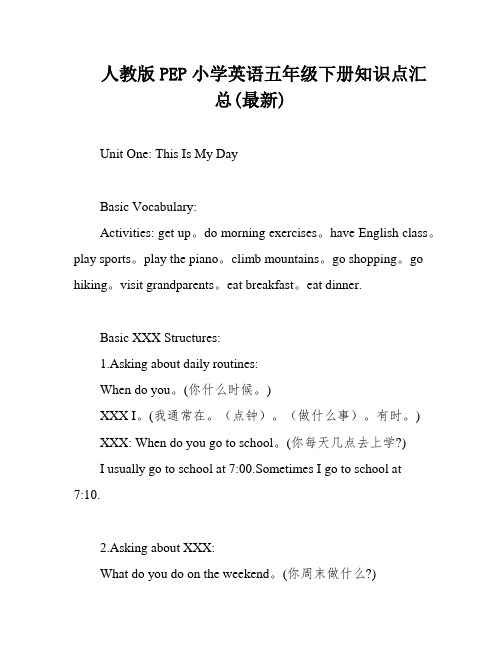
人教版PEP小学英语五年级下册知识点汇总(最新)Unit One: This Is My DayBasic Vocabulary:Activities: get up。
do morning exercises。
have English class。
play sports。
play the piano。
climb mountains。
go shopping。
go hiking。
visit grandparents。
eat breakfast。
eat dinner.Basic XXX Structures:1.Asking about daily routines:When do you。
(你什么时候。
)XXX I。
(我通常在。
(点钟)。
(做什么事)。
有时。
)XXX: When do you go to school。
(你每天几点去上学?)I usually go to school at 7:00.Sometimes I go to school at7:10.2.Asking about XXX:What do you do on the weekend。
(你周末做什么?)XXX I。
(我通常/经常。
有时。
)XXX: What do you do on the weekend?I often play XXX I go shopping with my mom.3.Introducing one's own habits:Every weekend。
I go hiking。
(我每个周末远足。
)Every day。
I do my homework at 8:00 in the evening。
(我每天晚上8点做作业。
)4.Asking XXX:What do you do。
(你是干什么的?)Time:morning。
afternoon。
evening。
noon。
at night。
6:00.on Sunday。
PEP小学五年级英语下册知识清单

PEP小学五年级英语下册Unit 1 My day 知识清单【句型/语法知识点】一. 频度副词(放主语之后)。
always总是(100%); usually通常(80%); often 经常(60%);sometimes有时(30%);never从不(0%)二. 重点句型。
1. 询问别人什么时候做某事的句型及回答。
句型结构:问:When +助动词do/does + 主语(非三单/三单)+ 动原+ 其他?答:①主语(非三单)+(频度副词)+动原+ at + 时间点.例:问:When do you go to bed?答:I go to bed at 9:00p.m答:②主语(三单)+(频度副词)+动词三单形式(动词s/es)+ at + 时间点.例:问:When does Amy go to bed?答:She goes to bed at 9:00 p.m.2. 询问别人周末做什么的句型及回答。
句型结构:问:What +助动词do/does + 主语(非三单/三单)+ do + on the weekend?答:①主语(非三单)+(频度副词)+动原.例:问:What do you do on the weekend?答:I usually read books.答:②主语(三单)+(频度副词)+动词三单形式(即动词s/es).例:问:What does Amy do on the weekend?答:She often goes shopping with her mother .三.句型转换:1.肯定句↔一般疑问句:I usually get up at 6:00. ↔ Do you usually get up at 6:00?肯定回答:Yes, I do. 否定回答:No, I don’t.(第三人称时) He eats dinner at 6:00p.m. ↔ Does he eat dinner at 6:00p.m.?肯定回答:Yes, he does. 否定回答:No, he doesn’t.2.肯定句↔否定句:I like playing the piano. ↔ I don’t like playin g the piano.I can play the piano. ↔ I can’t play the piano.3.划线提问:⑴ I often go shopping on the weekend. → When do you go shopping ?⑵ I often go shopping on the weekend. → What do you do on the weekend?⑶ I go to school at 7:00. → When do you go to school?四. 语音:cl /kl/ clean clock class clever pl /pl / plate eggplant please playPEP小学五年级英语下册Unit 2 My favourite season 知识清单【四会单词】【重点句型】【句型/语法知识点】一. 重点句型1. 询问别人天气怎么样的句型及回答。
(完整版)人教版PEP五年级下册英语知识点复习总结
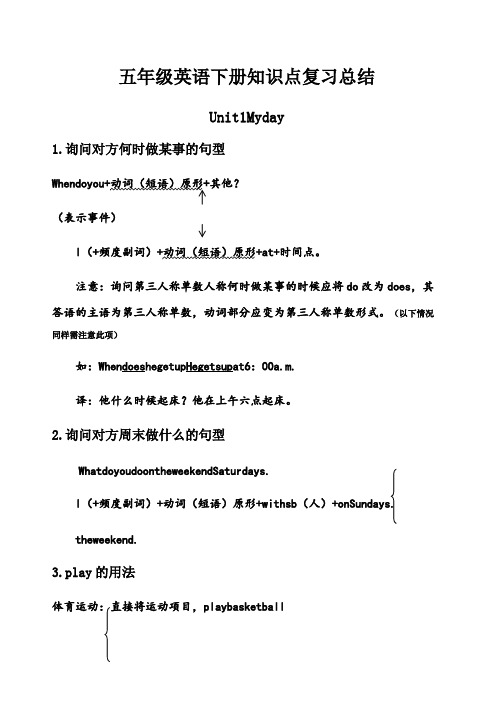
五年级英语下册知识点复习总结
Unit1Myday
1.询问对方何时做某事的句型
Whendoyou+动词(短语)原形+其他? (表示事件)
I(+频度副词)+动词(短语)原形+at+时间点。 注意:询问第三人称单数人称何时做某事的时候应将 do 改为 does,其 答语的主语为第三人称单数,动词部分应变为第三人称单数形式。(以下情况
同样需注意此项)
如:WhendoeshegetupHegetsupat6:00a.m. 译:他什么时候起床?他在上午六点起床。
2.询问对方周末做什么的句型
WhatdoyoudoontheweekendSaturdays. I(+频度副词)+动词(短语)原形+withsb(人)+onSundays. theweekend.
(2)在基数词后加 th:除去 first,second,third,其他基数词变序数词一般 直接在其后加 th。注意 five 与 twelve 要先把 ve 变 f,再加 th;eight 直接加 h;nine 去 e 再加 th。
(3)整十序数词以 ieth 结尾:整十位的序数词先将十位整数词尾的 y 变为 i, 再加 eth。如:twenty-twentieth。
The
注意:play-plays 因为 a 是元音 3)以 ch,sh,s,x 或 o 结尾的动词,在后面加-es; 例如 teach-teacheswash-washesdo-doesgo-goesfix-fixes
4)不规则的; 例如 have-has
5.by 的用法
人教版PEP五年级英语下册各单元语法点

人教版PEP五年级英语下册各单元语法点Unit 1: What Does She Do?- 一般现在时:用于描述日常活动或惯。
主语为第三人称单数时,动词加-s或-es。
- 观察寻找规律:第三人称单数的动词加-s或-es。
- Be动词+动词-ing:用于描述正在进行的动作。
主语为第三人称单数时,be动词用is。
- 一般现在时的否定句:在动词前面加don't/doesn't。
- 一般现在时的疑问句:将do/does置于主语之前。
Unit 2: Can You Run?- Can的用法:用于表示能力和询问对方是否能够做某事。
- Can的否定形式:在can后面加not或缩略形式can't。
- Can的疑问形式:将can置于句首。
Unit 3: What Are They Doing?- 现在进行时:用于描述正在进行的动作。
动词加-ing。
- 现在进行时的否定句:在be动词后面加not。
- 现在进行时的疑问句:将be动词置于句首。
Unit 4: I'm Sitting at the Front.- 介词短语表示地点:用于描述人或物所在的位置。
- 介词on、in、under、behind、in front of、next to等的用法。
Unit 5: What Are You Going to Do?- be going to的用法:表示将来要做的事情。
- be going to的否定形式:在be动词后面加not。
- be going to的疑问形式:将be动词置于句首。
Unit 6: It's Raining!- 祈使句:用于表示请求、命令或建议。
动词原形作谓语。
- 祈使句的否定形式:在动词前面加don't。
- 祈使句的疑问形式:用Do开头。
Unit 7: How Often Do You Exercise?- 表示频率的副词:用于描述动作发生的频率。
- always, usually, often, sometimes, hardly ever, never等的用法。
人教版PEP小学英语五年级下册unit1至unit3知识点归纳
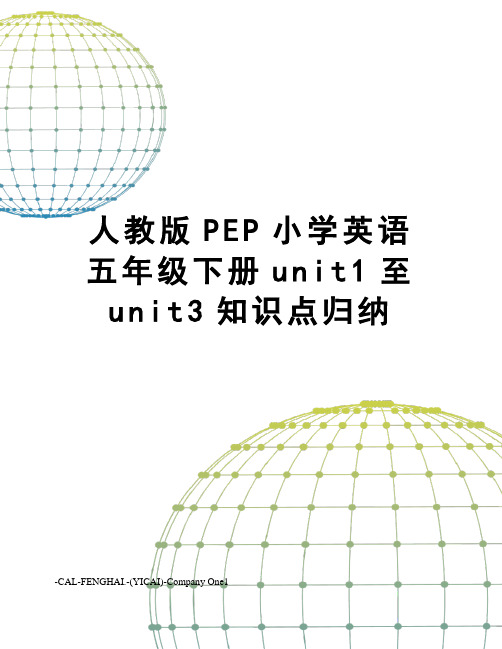
人教版P E P小学英语五年级下册u n i t1至u n i t3知识点归纳-CAL-FENGHAI.-(YICAI)-Company One1五年级下册Unit 1-3重点难点、单元单词、短语和知识点知识梳理第一单元知识点一、主要单词:do morning exercises晨练,做早操 eat breakfast吃早饭 have English class上英语课 play sports进行体育活动 eat dinner吃晚饭 eat lunch吃午饭 climb mountains爬山 go shopping购物,买东西 play the piano弹钢琴 visit grandparents看望(外)祖父母 go hiking去远足二、主要句子:When do you eat dinner你什么时候吃晚饭I eat dinner at 7:00 in the evening.我晚上七点吃晚饭。
When do you get up你什么时候起床I usually get up at 12:00 at noon.我通常在中午12点起床。
What do you do on the weekend你在周末干什么Usually I watch TV and go shopping.我通常看电视和购物。
Sometimes I visit my grandparents.有时候我去看望我的外祖父母。
I often play football.我经常踢足球。
Sometimes I go hiking.有时候我去远足。
三、同义词eat breakfast—have breakfast eat lunch—have luncheat dinner—have dinner play sports—do sports usually—often复数形式:policeman—policemen policewoman—policewomen现在分词:tell—telling三单:say—says同义句:What do you do ---What are you你是干什么的四、表示频度的副词:always总是,一直 usually通常,常常 often经常 sometimes有时候五、以复数形式出现的词组:visit grandparents plant trees介词后跟表示时间的词语时,表示在某年、某月、某个季节,某个时候(在上午,在下午,在晚上)用in;表示在某一天,在星期几用on,在具体的几点几分用at.七、too 和either的用法区别:too和either都是“也”的意思,但too用于肯定句,either用于否定句。
人教版PEP五年级英语下册各单元词汇点
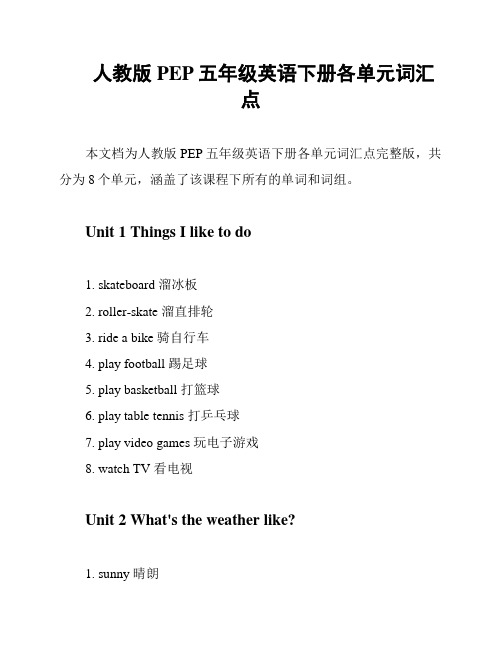
人教版PEP五年级英语下册各单元词汇点本文档为人教版PEP五年级英语下册各单元词汇点完整版,共分为8个单元,涵盖了该课程下所有的单词和词组。
Unit 1 Things I like to do1. skateboard 溜冰板2. roller-skate 溜直排轮3. ride a bike 骑自行车4. play football 踢足球5. play basketball 打篮球6. play table tennis 打乒乓球7. play video games 玩电子游戏8. watch TV 看电视Unit 2 What's the weather like?1. sunny 晴朗2. cloudy 多云3. rainy 下雨4. snowy 下雪5. windy 有风6. hot 热7. cold 冷Unit 3 At a pet shop1. parrot 鹦鹉2. rabbit 兔子3. hamster 仓鼠4. cat 猫5. dog 狗6. fish 鱼7. turtle 乌龟Unit 4 My family 1. grandfather 爷爷2. grandmother 奶奶3. father 爸爸4. mother 妈妈5. older brother 哥哥6. older sister 姐姐7. younger brother 弟弟8. younger sister 妹妹Unit 5 My school day1. classroom 教室2. library 图书馆3. playground 操场4. art room 美术室5. music room 音乐室7. canteen 食堂8. restroom 卫生间Unit 6 Fun with nature1. flowers 花2. grass 草3. trees 树木4. leaves 叶子5. rocks 石头6. mountains 山7. rivers 河流Unit 7 Countryside holidays1. tent 帐篷2. sleeping bag 睡袋3. campfire 篝火4. fishing rod 钓鱼竿5. boat 船6. bike 自行车7. camera 照相机Unit 8 Where's my schoolbag?1. schoolbag 书包2. desk 课桌3. chair 椅子4. blackboard 黑板5. pencil case 铅笔盒6. ruler 尺子7. eraser 橡皮擦以上为本文档的单词和词组列表,希望能够帮助学习人教版PEP五年级英语下册的同学们更好地掌握课程内容。
人教PEP版小学五年级下册英语第二单元知识点
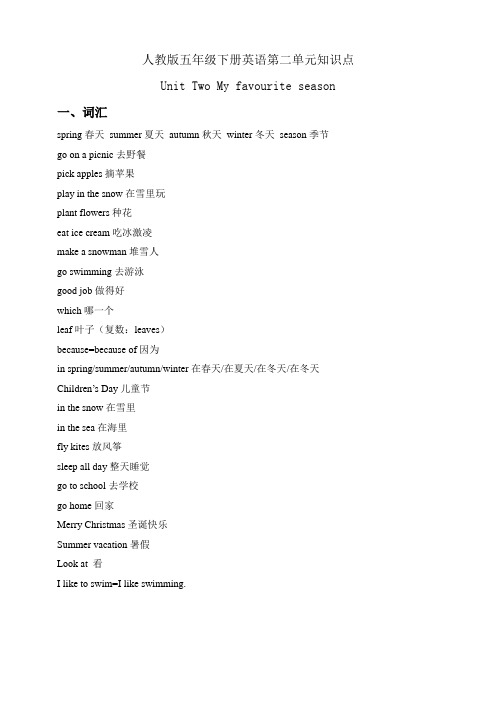
人教版五年级下册英语第二单元知识点Unit Two My favourite season 一、词汇spring春天summer夏天autumn秋天winter冬天season季节go on a picnic去野餐pick apples摘苹果play in the snow在雪里玩plant flowers种花eat ice cream吃冰激凌make a snowman堆雪人go swimming去游泳good job做得好which哪一个leaf叶子(复数:leaves)because=because of因为in spring/summer/autumn/winter在春天/在夏天/在冬天/在冬天Children’s Day儿童节in the snow在雪里in the sea在海里fly kites放风筝sleep all day整天睡觉go to school去学校go home回家Merry Christmas圣诞快乐Summer vacation暑假Look at 看I like to swim=I like swimming.二、语法(一)Which引导的特殊疑问句,就最喜欢的季节是哪一个进行提问Which season do you like best?回答:I like+季节+best.或者I like+季节.或者直接说季节名称。
拓展:What is your favourite season?回答: My favourite season is+季节.季节+is my favourite season.(二)What引导的特殊疑问句,就天气进行提问What is the weather like today?回答:It is......(三)What引导的特殊疑问句,就在某一个季节做某事进行提问What do you often do in +季节?回答:I often+具体的事情.三、重要句子Which season do you like best?I like spring best.Why do you like autumn best?Because the colours are pretty.There are beautiful flowers everywhere.I can sleep all day.How about you?=What bout you?I like summer best.because of Children’s Day.Look at my picture.The weather is good and the colours are beautiful.There is lots of snow.I want to paint a picture ,too.What is your favourite season?My favourite season is spring四、语音(辅音字母组合发音)①br发音为/br/br own li br ary br other um br ella br eakfast②gr发音为/gr/gr een gr apes gr andpa gr ow gr ass gr eat五、拓展①Why和because的用法Why 引导询问原因的特殊疑问句。
PEP小学英语五年级下册unit1--6单元重难点汇总
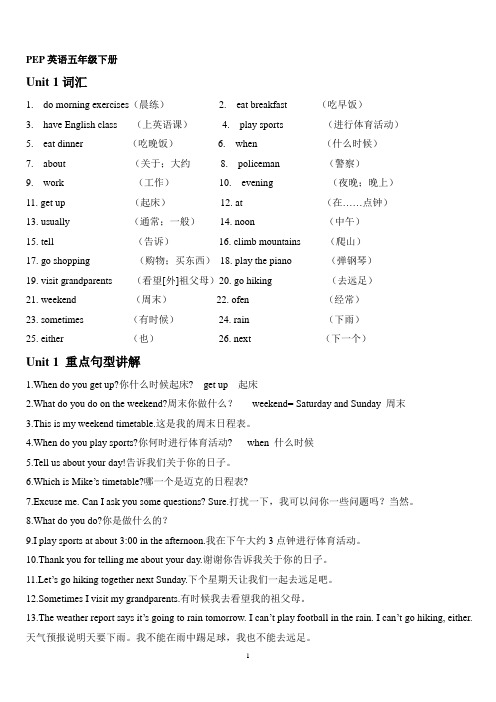
PEP英语五年级下册Unit 1词汇1. do morning exercises(晨练)2. eat breakfast (吃早饭)3. have English class (上英语课)4. play sports (进行体育活动)5. eat dinner (吃晚饭)6. when (什么时候)7. about (关于;大约8. policeman (警察)9. work (工作)10. evening (夜晚;晚上)11. get up (起床)12. at (在……点钟)13. usually (通常;一般)14. noon (中午)15. tell (告诉)16. climb mountains (爬山)17. go shopping (购物;买东西)18. play the piano (弹钢琴)19. visit grandparents (看望[外]祖父母)20. go hiking (去远足)21. weekend (周末)22. ofen (经常)23. sometimes (有时候)24. rain (下雨)25. either (也)26. next (下一个)Unit 1 重点句型讲解1.When do you get up?你什么时候起床? get up 起床2.What do you do on the weekend?周末你做什么?weekend= Saturday and Sunday 周末3.This is my weekend timetable.这是我的周末日程表。
4.When do you play sports?你何时进行体育活动? when 什么时候5.Tell us about your day!告诉我们关于你的日子。
6.Which is Mike’s timetable?哪一个是迈克的日程表?7.Excuse me. Can I ask you some questions? Sure.打扰一下,我可以问你一些问题吗?当然。
PEP小学英语五年级下册各单元要点总结
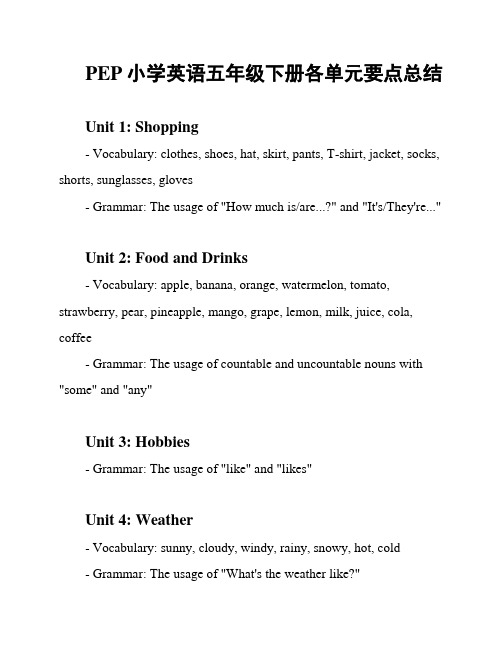
PEP小学英语五年级下册各单元要点总结Unit 1: Shopping- Vocabulary: clothes, shoes, hat, skirt, pants, T-shirt, jacket, socks, shorts, sunglasses, gloves- Grammar: The usage of "How much is/are...?" and "It's/They're..."Unit 2: Food and Drinks- Vocabulary: apple, banana, orange, watermelon, tomato, strawberry, pear, pineapple, mango, grape, lemon, milk, juice, cola, coffee- Grammar: The usage of countable and uncountable nouns with "some" and "any"Unit 3: Hobbies- Grammar: The usage of "like" and "likes"Unit 4: Weather- Vocabulary: sunny, cloudy, windy, rainy, snowy, hot, cold- Grammar: The usage of "What's the weather like?"Unit 5: Classroom- Vocabulary: desk, chair, blackboard, eraser, pencil, ruler, book, pen, bag, sharpener, glue, scissors- Grammar: The usage of prepositions "on", "in", and "under"Unit 6: Daily Routines- Vocabulary: get up, have breakfast, brush teeth, go to school, have lunch, do homework, have dinner, take a bath, go to bed- Grammar: The usage of present simple tense with daily routinesUnit 7: Jobs- Vocabulary: doctor, teacher, driver, police officer, firefighter, chef, engineer, artist, musician, journalist, scientist, astronaut- Grammar: The construction "What does he/she do?" and the usage of adjectives to describe jobsUnit 8: Animals- Vocabulary: dog, cat, bird, fish, rabbit, monkey, tiger, lion, elephant, panda, giraffe, snake, kangaroo- Grammar: The usage of "Can" to talk about abilitiesUnit 9: Festivals- Vocabulary: Spring Festival, Christmas, Thanksgiving, Easter, Halloween, Lantern Festival, Dragon Boat Festival, Mid-Autumn Festival, National Day- Grammar: The usage of "When is...?" and the construction "I like... because..."Unit 10: My City- Vocabulary: park, supermarket, hospital, school, post office, bank, library, restaurant, cinema, zoo, museum, airport, train station, subway - Grammar: The usage of prepositions "near", "next to", and "between"以上是PEP小学英语五年级下册各单元的要点总结。
人教版小学PEP英语五六年级下册知识点归纳

⼈教版⼩学PEP英语五六年级下册知识点归纳Unit 1 My day⼀、重点词汇。
五、重点句型。
1、询问别⼈什么时候做某事的句型及回答。
句型结构:问:When do you+动词短语原形+其他?(你/你们什么时候做某事?)答:I/We(+频度副词)+动词短语原形+at+具体时间(我/我们通常在⼏点做某事。
)例:问:When do you go to bed?(你什么时候上床睡觉?)答:I go to bed at 9:00p.m (我晚上9点上床睡觉。
)注意:当主语是第三⼈称单数(he,she,it,单个⼈名或单数名词)时,助动词do要变成does,句型结构是:When does+主语(第三⼈称单数)+动词短语原形+其他?2、询问别⼈周末做什么的句型及回答。
句型结构:问:What do you do on theweekend?(你周末做什么?)答:I(+频度副词)+动词(短语)+其他。
例:问:What do you do on theweekend?(你周末做什么?)答:I usually read books. (我通常看书。
)注意:当主语是第三⼈称单数(he,she,it,单个⼈名或单数名词)时,助动词do要变成does,句型结构是:What does+主语(第三⼈称单数)+do+on the weekend?六、四会句⼦:When do you finish class in the morning ? 你们上午的课到⼏点结束?We finish class at 1 o’clock . 我们⼀点钟结束上午的课。
What do you do on the weekend ? 你周末做什么?I often watch TV and play ping-pong with my father . 我经常看电视,也常和我爸爸⼀起打乒乓球。
七、语⾳:cl /kl/ clean clock class cleverpl /pl / plate eggplant please playUnit 2 My favourite season三、重点句型1、询问别⼈天⽓怎么样的句型及回答。
- 1、下载文档前请自行甄别文档内容的完整性,平台不提供额外的编辑、内容补充、找答案等附加服务。
- 2、"仅部分预览"的文档,不可在线预览部分如存在完整性等问题,可反馈申请退款(可完整预览的文档不适用该条件!)。
- 3、如文档侵犯您的权益,请联系客服反馈,我们会尽快为您处理(人工客服工作时间:9:00-18:30)。
PEP五年级下册各单元知识重点Unit 1 This Is My Day我会背:do morning exercises晨练eat breakfast吃早饭have english class上英语课play sports进行体育运动eat dinner吃晚饭when什么时候evening夜晚;晚上get up起床at在……点钟usually通常;一般noon中午climb mountains爬山go shopping购物;买东西play the piano弹钢琴visit grandparents看望祖父母go hiking去远足weekend周末often经常sometimes有时候话题:日常生活1.When do you do morning exercises? 你什么时候做早操?I usually do morning exercises at 8:00. 我经常八点钟做早操。
(I usually get up at 12:00 noon . 我经常在中午十二点起床。
)2.When do you eat dinner ? 你什么时候吃晚餐?I eat dinner at 7:00 in the evening. 我在晚上七点钟吃晚餐。
3. What do you do on the weekend ? 你周末做什么?I usually climb mountains. 我通常去爬山。
I often play sports .我经常经行体育锻炼。
Sometimes I play the piano . 有时候我弹钢琴。
Unit 2 My Favourite Season我会背:spring春天summer夏天fall秋天winter冬天season季节which哪一个best最;极swim游泳fly kites放风筝skate滑冰make a snowman堆雪人plant trees种树why为什么because因为sleep睡觉favourite 最喜爱的话题:季节1.Which season do you like best ? I like spring best.(Spring.)你最喜欢是什么季节?我最喜欢春季。
(春季)2.What is your favourite season? My favourite seson is winter.( Winter.) 你最喜爱的季节是什么季节?我最喜爱的季节是春季。
3.Why do you like summer? Because I can…….(Because it’s warm ,windy and sunny.) 你为什么喜欢夏天?因为我可以……(因为天气是……)4.I like summer, because I can swim in the lake. 我喜欢夏天。
因为我可以在湖里游泳。
5.Spring is good ,but fall is my favourite season.春天是好的。
但秋天是我最喜欢的季节。
6.What’s the weather like in fall in? It’s sunny and cool.秋天的北京是什么天气?是晴朗和凉爽的。
7.What season is it in March in Beijing? It’s spring.在北京的三月份是什么季节?是春天。
8.When is the best time to go to Beijing? Fall. 最好在什么时候去北京?秋天。
Unit 3 My Birthday我会背:Jan./January一月Feb./February二月Mar./March三月Apr./April四月May五月June六月July七月Aug./August八月Sept./September九月Oct./October十月Nov./November十一月Dec./December十二月birthday生日date日期her 她的话题:生日节日1.When is Teacher’s Day? 什么时候是教师节?2.Whose birthday is in July ? Mike’s birthday is in July.谁的生日在七月?Mike的生日在七月。
3.Is her birthday in June? Yes,she is . No, she isn’t .她的生日在六月吗?是的。
不是的4.When is your birthday? My birthday is in May.你的生日是什么时候?我的生日在五月。
What’s the date? It’s May 10th.几号?五月十日。
one---first six---sixth twelve---twelfthtwo---second seven---seventh thirteen---thirteenth three---third eight---eighth twenty---twentiethfour---fourth nine---ninth twenty-one---twenty-first Five---fifth eleven---eleventhUnit 4 What Are You Doing?我会背:draw pictures画画cook dinner做饭read a book看书answer the phone接电话listen to music听音乐clean the room打扫房间write a letter写信write an e-mail写电子邮件do the dishes 洗碗study书房grandpa 爷爷talk 说话话题:日常生活时态:现在进行时( be doing now )1.What is Zhang Peng doing ? 张鹏正在做什么?He is answering the phone. 他正在听电话。
Grandpa is writing a letter. 外祖父正在写信。
Brother is doing homework . 哥哥(弟弟)正在做作业。
Mom is cooking dinner in the kitchen. 妈妈正在厨房里做饭。
Father is writing an e-mail. 爸爸正在写电子邮件。
2.Hello, this is Zhang Peng. 你好,这是张鹏。
Can I speak to Chen Jie ,Please? 我可以跟陈洁通话吗?Sure. Please hold on. She’s listening to music. 可以。
请别挂机。
她正在听音乐。
3.What are you doing? I am doing the dishes. 你正在做什么?我正在洗碗碟。
Unit 5 Look at the Monkeys我会背:Fly--- 飞jump--- 跳walk--- 走run--- 跑swim--- 游泳sleep--- 睡觉climb--- 往上爬fight--- 打架swing--- 荡;荡秋千drink water--- 喝水kangaroo 袋鼠话题:动物时态:现在进行时1.What do you see ? I see two kangaroos. 你看见什么?我看见两只袋鼠。
2.What can monkey do? It can swing. 猴子能干什么? 它会荡秋千。
3.What is the mother kangaroo doing? 袋鼠妈妈正在做什么?She’s jumping. 她正在跳跃。
4.Look at the monkey. What is it doing ? It’s eating bananas.看那只猴子。
它正在做什么?它正在吃香蕉。
5.What are the tigers doing ? They are fighting. 老虎正在做什么?它们在打架。
6.What is she doing ? She is swimming . 她正在干什么?她正在游泳。
7.What are they doing ? They are climbing trees. 他们正在干什么?他们正在爬树。
8.Are you eating lunch ? 你们(你)正在吃午餐吗?Yes, I am . No, I am not . Yes, we are. No, we aren’t.我是。
我不是我们是。
我们不是。
9.Are the ants eating honey ? 蚂蚁正在吃蜜糖吗?Yes, they are. No ,they aren’t .它们是。
它们不是。
10.Can tigers swim? 老虎会游泳吗?Yes,they can. No, they can’t. 它们会。
它们不会。
Unit 6 A Field Trip我会背:take pictures照相watch insects观察昆虫pick up leaves采摘树叶do an experiment做实验catch butterfly捉蝴蝶have a picnic举行野餐count insects数昆虫collect leaves收集树叶write a report写报告play chess下棋honey蜂蜜话题:日常活动时态:现在进行时1.Is John playing chess? Yes, he is . No, he isn’t .John正在下棋吗?他是。
他不是。
2.Is Amy counting insects ? Yes, she is. No, she isn’t .Amy正在书昆虫吗?是,她是。
她不是。
3.What are they doing? What are you doing? What is he doing?They are playing chess. I am doing homework. He is singing.Are they playing chess? Are you doing homework? Is he singing?语法考点:附:What can I do in Beijing? 我在北京能做什么?You can go to the Great Wall. 你可以去长城。
